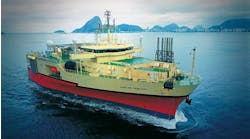Offshore staff
LONDON — The cost of decommissioning the UK’s oil and gas infrastructure has come down by 25% in the past five years, according to the latest estimates from the North Sea Transition Authority (NSTA).
Its Decommissioning Cost Estimate Report 2022 highlights ways the industry can generate savings for UK taxpayers and perform projects in a more cost-effective manner.
The forecast estimate fell by 2% last year to £44.5 billion (US$53.87 billion), contributing to a total reduction of 25% since 2017, when the NSTA introduced a baseline estimate of £59.7 billion (US$72.23 billion).
At the time, it also set a target of reducing costs by 35% to £39 billion (US$47.17 billion) by year-end 2022, which it aimed to achieve by encouraging companies to share their experience and lessons learned to improve project execution.
While the industry made swift progress in the first two years of the target, the reduction rate then slowed due partly to the logistical and economic pressures brought on by the pandemic.
On the positive side, the final costs of completed projects are now on average 20% to 25% lower than initially predicted, over the five years, the report added.
Last year UK decommissioning expenditure totaled £1.2 billion (US$1.45 billion), lower than the forecast £1.4 billion (US$1.69 billion), thanks to improved project execution and COVID-19-related deferrals of activity.
Overall spending on the sector should now rise to a peak of more than £2.5 billon (US$3.02 billion) over the next two decades.
This presents an opportunity for the supply chain to develop cost-efficient services and secure more work overseas, the NSTA claimed.
However, improving performance on costs could be difficult in the short term due to market inflation and competition for resources from other energy sectors. So the report asks the industry to ensure it plans effectively, collaborates on innovative commercial models, deploys new technologies and, where possible, reuses and repurposes infrastructure.
In the latter case, the new applications include carbon storage.
The NSTA added that UK offshore well decommissioning campaigns have been delivering better value and fewer emissions, as shown by the recent, longer-term contract awards.
And the NSTA has been using data and digital solutions, such as its Energy Pathfinder portal, Decommissioning Data Visibility pilot project and Suspended Wells application, to clarify upcoming work for suppliers.
“The sector must not lose focus and allow inflation to drive up prices. Now is the time to build on the progress already made," said Pauline Innes, NSTA's head of decommissioning. “The NSTA is determined to help the sector pick up momentum, including through the introduction of new estimates and targets.”
08.04.2022



